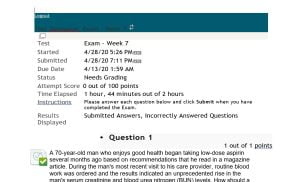COURSE
NURS 6521 Advanced Pharmacology
Number of Questions; 1 -100
DRUGS
3. Question: The APRN is caring for a patient taking a calcium-channel blocker for hypertension. The APRN should monitor the patient for what common side effects of this medication?
7. Question: A patient in need of myocardial infarction prophylaxis has been prescribed sulfinpyrazone for gout. Which of the following will the nurse monitor the patient most closely for?
Test #1
1. Question: A Nurse Practitioner is providing a patient with a list of drugs as a part of the patient’s plan of care. Which of the following drug nomenclatures should the Nurse Practitioner use to list the drugs?
4. Question: The recommended range for maintaining serum theophylline levels is:
5. Question: A Nurse Practitioner is conducting an assessment of a patient who has recently had several changes made to her drug regimen. What assessment question most directly addresses the safety implications of the patient’s drug regimen?
6. Question: Which antihypertensive agent is associated with hair growth?
7. Question: The Nurse Practitioner is preparing to Prescribe a medication regimen for her patient. He or she recognizes that criteria for choosing an effective drug for any disorder include:
8. Question: A Nurse Practitioner is caring for a 73-year-old man who is receiving drug therapy. He is beginning to exhibit signs of decline in his renal system, yet his current serum creatinine level is normal. The Nurse Practitioner will base the patient’s plan of care on the understanding that there is:
9. Question: During a clinic visit, a patient complains of having frequent muscle cramps in her legs. The nurse’s assessment reveals that the patient has been taking over-the-counter laxatives for the past 7 years. The nurse informed the patient that prolonged use of laxatives:
10. Question: A patient comes to the clinic asking for help to quit drinking alcohol. She has a 21-year history of heavy drinking and is worried about developing cirrhosis of the liver. The patient agrees to take disulfiram (Antabuse). The nurse will teach the patient that the combination of alcohol and Antabuse will cause which of the following?
11. Question: Which effect does the Nurse Practitioner expect may occur when using cholinergic agonists?
12. Question: Which of the following is a potential adverse side effect of autonomic-anticholinergic agents?
13. Question: Ms. Simpson has a known history of asthma. She is on Theophylline daily. The NP contemplates giving her an antibiotic for her respiratory infection. The NP knows that which choice below could elevate theophylline levels?
16. Question: Glargine (Lantus) is an insulin analog that essentially has no peak and is usually administered:
17. Question: The side effects of antihistamines are mostly due to their:
18. Question: Autonomic drugs have little effect when administered:
19. Question: The point in time on the drug concentration curve that indicates the first sign of a therapeutic effect is the:
21. Question: Which of the following statements best defines how a chemical becomes termed a drug?
22. Question: Glucocorticoids affect the metabolism of carbohydrates, protein, and fats.
24. Question: What drug class will decrease the facial flushing that occurs with niacin?
26. Question: Biguanides control hyperglycemia in type 2 diabetes primarily by acting at which organ?
28. Question: Which medication class is recognized for the treatment of moderate to severe dementia?
30. Question: A patient who is a, steroid-dependent asthmatic is started on a beclomethasone inhaler. Which should be part of patient education?
32. Question: A 65-year-old male presents with a history of worsening urinary urgency, frequency, and hesitancy. He also tells you that he has to “push really hard” to urinate and that his urine dribbles a little after he is done urinating. What medication should be avoided:
33. Question: Successful treatment for an adult patient with Helicobacter pylori (H. pylori)-induced peptic ulcer disease requires therapy with which regimen?
34. Question: Which can elevate theophylline levels?
ANSWERS

……….please click the icon below to purchase full answer at $22